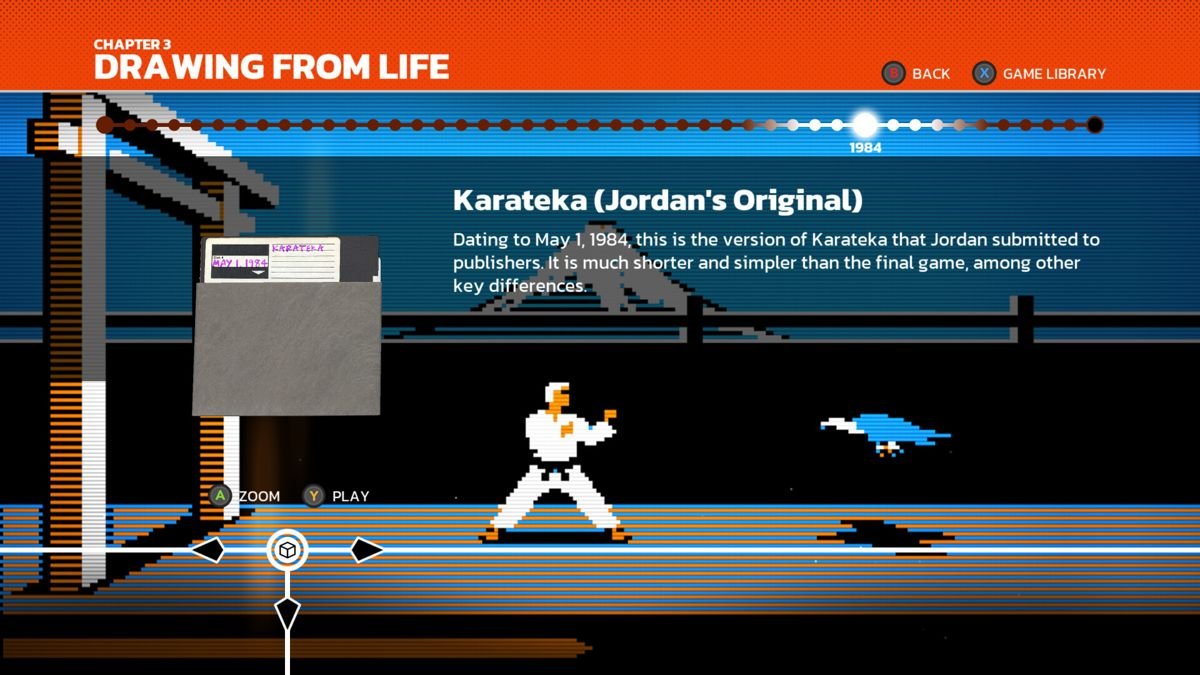The Making of Karateka review
Wow, this is something special! Hot on the heels of Atari 50: The Anniversary Celebration the folks at Digital Eclipse have delivered another stellar interactive documentary, one that really delivers on their new innovative game genre.
As with Atari 50 before it, The Making of Karateka is a documentary in video game form. Much like a documentary film, the game aims to inform you, deliver factual historical details, and tell a true story. But in this case, the medium definitely is the message—because this is a documentary you can actually play! Digital Eclipse appears to have perfected the interactive documentary video game.
From their website:
The Making of Karateka is the first entry in Digital Eclipse's Gold Master Series, which presents iconic games in an innovative "interactive documentary" format, putting the shared history of games and their creators into one comprehensive package.
As mentioned above, The Making of Karateka is actually the first in a series of interactive documentary games, called the “Gold Master Series”. The next entry is already out as well, Llamasoft: The Jeff Minter Story.
While Karateka is the main focus, the documentary manages to tell the bigger story of how Jordan Mechner got started in the video game industry. Thanks to the fact that Mechner kept such meticulous journals going back to his college years—and that he had the forethought to preserve so much material of his design process—you really get an incredible view of how Karateka (and other early computer games) came to be.
Deathbounce: Rebounded is a crazy good time.
The Making of Karateka’s story starts well before development of Karateka had even begun, documenting Mechner’s first attempts at creating commercial computer games. These were mostly just iterations on the arcade classic Asteroids. One of them which came close to being released was called Deathbounce, and its various versions are available to play here. In fact, Digital Eclipse created a new remastered version using a more modern “dual stick” style control scheme, called Deathbounce: Rebounded. And I must say, the new Deathbounce is super fun! Truly a dark horse classic to spice up the documentary.
As a documentary, I thought The Making of Karateka was surprisingly enjoyable, and oddly compelling. It’s all about Jordan Mechner and his game-making process, plus insights into Broderbund, the company who published Karateka (as well as notable hits like Choplifter, Lode Runner, Where in the World Is Carmen Sandiego?, and Myst). There’s enough personal details included that, by the time the doc was over, Mechner almost felt like an old friend somehow. I found myself really rooting for this college kid (in the mid 80’s) to succeed.
For example, it turns out that Jordan’s dad, Francis Mechner, actually composed the music for Karateka. Jordan interviews his dad in the documentary and it’s legitimately heartwarming to see them reminisce about old times. Perhaps this had an impact on me personally because my Dad is a musician as well, but their father/son dynamic was beautifully poignant.
Father and son discuss early computer game music composition.
Of course, as an interactive documentary, this game enables you to play all the various versions of Karateka Mechner made, from prototypes to all commercial releases for the different 8-bit home computers. And just like with Deathbounce, the folks at Digital Eclipse include an enhanced remastered version.
The game’s final chapter covers the initial development of a sequel that was ultimately never produced. Karateka 2 would again use rotoscoped visuals, but this time change the gameplay into more of a side-scrolling platfomer. Of course, that project eventually evolved into 1989’s hit, Prince of Persia.
After watching all the videos, reading all the correspondence, reviewing all the design docs, and playing all the games, the documentary had taken about 5 hours to finish. I’m sure my playtime will increase beyond that however, since I still want to play more Deathbounce: Rebounded and Karateka Remastered.
All in all, The Making of Karateka is both impressive and inspiring, and I genuinely recommend it. If you’re a fan of Karateka then buying this one is a no-brainer; it has everything you could ever want, and then some! But even for people less into Karateka and more into video game history, this game is definitely worthy of your time and attention. Especially for anyone interested in game development, this interactive documentary is worth its weight in pixelated gold.
Images from MobyGames







